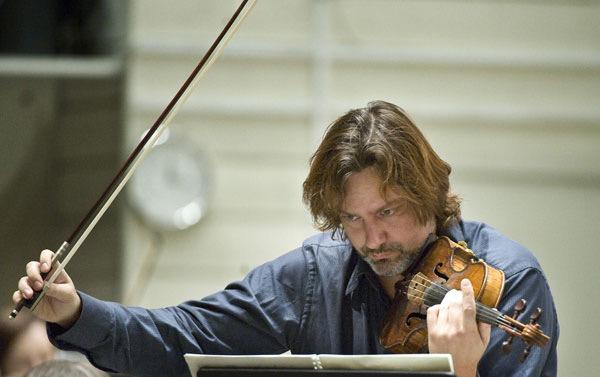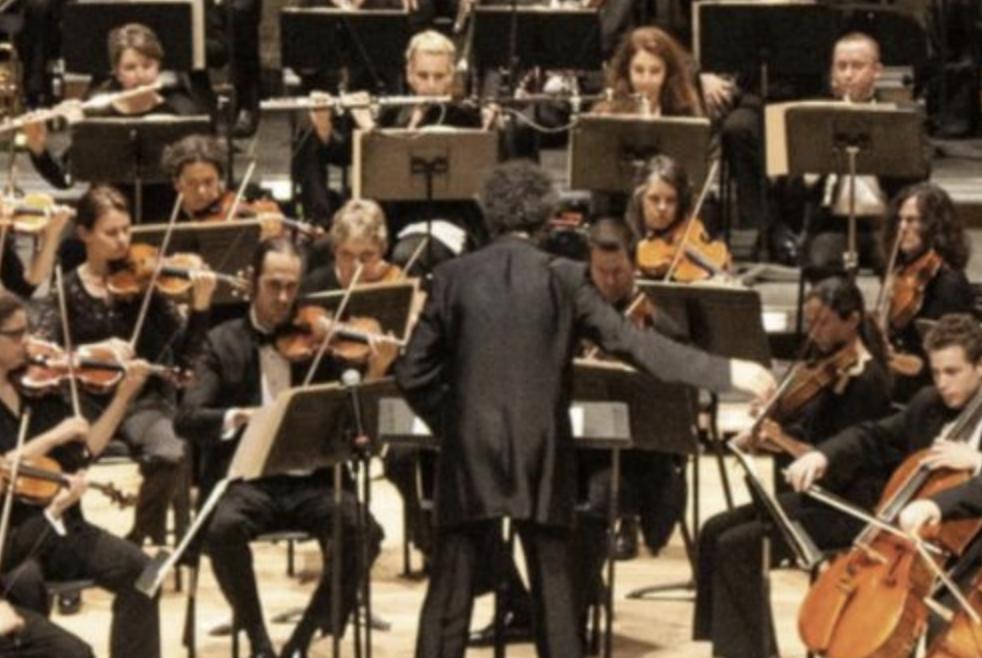Ever since the March 23 shutdown of “nonessential businesses” ordered by Maryland Gov. Larry Hogan because of the COVID-19 pandemic, the arts have been put on hold across the state. Especially, performing arts. Art galleries, for instance, were allowed to reopen in May with restrictions. But because of social distance requirements, indoor theaters—including movies—and concert halls remain dark. And will remain so until the virus abates or effective treatments or vaccines emerge.
Here’s how some of our region’s leading performing arts institutions are responding to months, if not a year or more, without live in-person audiences.
ANNAPOLIS SYMPHONY ORCHESTRA
“Despite of all the sorrow and distress this situation is bringing to our daily lives, one thing this pandemic has reminded all of us is how valuable the arts are to keep us centered and to bring some level of desperately needed spirituality while surviving in different modes of confinement,” says Annapolis Symphony Orchestra maestro, Jose-Luis Novo. “We are doing all we can to keep bringing great music and educational experiences to our community, even if we can’t be physically together.”
“This spring, we were saddened to cancel nearly a dozen concerts and events, including four of our Masterworks concerts,” says Edgar Herrera, the orchestra’s general manager. “Our musicians were forced out of work. The board and staff felt it was important to take care of our symphony family during such an unprecedented time. We’ve created the Annapolis Symphony Musician Fund, and the box office offered ticket holders the opportunity to receive a refund or donate the cost of their tickets. The response from our patrons was absolutely incredible, receiving about 80 percent in ticket donations. Thanks to our audience, along with the Paycheck Protection Program”—passed by Congress on April 23 and signed by President Trump—“the symphony was able to pay all of our musicians their full salary for the canceled concerts.”
In April, Annapolis Symphony musicians got together to offer comfort and consolation as COVID was at its peak in New York and New Jersey and spreading virulently in the D.C. suburbs of Maryland.
“Even if we are currently confined at home, we are not alone, Novo said at the time. “We are relying on our great music to stay close and help get us through.”
That help came in the form of a virtual performance of Beethoven’s beloved “Ode to Joy” from his Symphony No. 9. It was accomplished by individual symphony musicians self-recording their parts in “Ode” alone, each of which was compiled into a video posted online.
On July 21, Herrera announced cancellation of the Pops in the Park concert that would have taken place on Labor Day weekend at Quiet Waters Park because the City of Annapolis canceled its summer series due to the virus.
As for the upcoming season, Herrera says, “At this point, we intend to perform five Masterworks programs, one family concert and a holiday pops performance. Nevertheless, we’re exploring outdoor concert sites for the fall”—in case indoor concerts are COVID-canceled. “Our top priority,” he added, “is the safety of our musicians, staff and patrons.”
annapolissymphony.org, 410-263-0907
ANNAPOLIS SHAKESPEARE COMPANY

The Unified Jazz Ensemble will perform in a virtual cabaret series concert presented by the Annapolis Shakespeare Company streaming on Aug. 15.
“We’re bursting to get out from under the house-arrest shutdown,” says Sally Boyett, founding artistic director of the only predominantly Actors’ Equity theater company in the Anne Arundel and Mid-Shore region. Annapolis Shakespeare lost most of its spring and summer season, with cancellations of “Treasure Island” at its main-stage theater on West Street and an outdoor run of the Bard’s “A Midsummer Night’s Dream.”
Awaiting the chance for a shutdown “jail-break”—Boyett does not argue against its necessity due to public health priorities—she remains hopeful of presenting a couple of short but sweet outdoor pieces this fall, including a “fast and furious” Moliere farce—health conditions allowing. More certain are virtual performances, including the “Spoon River Anthology,” inspired by Greek poetry epitaphs, and personal monologues by company actors—many posted now on the ASC website—and an interview series about what it takes to create a theatrical production.
More ambitious are plans for a 60-minute virtual cabaret show, featuring the Annapolis-based Unified Jazz Ensemble, on the evening of Aug. 15. Recorded live from the ASC sound stage, the performance will be available online from the company’s website and on YouTube. A virtual gala follows on Sept. 19, a fundraiser available for a fee yet to be announced.
But for now, the Shakespeare company’s intimate 125-seat main stage theater and its 76-seat cabaret room remain dark to live audiences and the theater’s expansion plans are on hold as are its 120 live shows a year.
annapolisshakespeare.org, 410-415-3513
MID-ATLANTIC SYMPHONY ORCHESTRA

Kurt Nikkanen is the violin soloist for the rescheduled season finale for the Mid-Atlantic Symphony Orchestra in Ocean City Aug. 16
“We’re optimistic and realistic at the same time,” says Mid-Atlantic Symphony Orchestra general manager Dane Krich. “We’re just trying to find a balance.”
The Easton-based symphony that also performs at Chesapeake College, Ocean City and beach communities in southern Delaware was forced to cancel the finale of its 2019-20 season in April due to COVID. The concert is to be made up at the Ocean City Performing Arts Center on Aug. 16 with a revised program that takes into account the limitations of spacing the musicians, even on as large a stage as the Ocean City center. An all-Mozart program, entailing just a few brass and wind instruments and fewer musicians overall, features solo violinist Kurt Nikkanen. “We’re trying to give some hope where there’s a lot of stress out there,” says Krich. The program, Mozart’s Violin Concerto No. 5, his Symphony No. 40 and Adagio and Fugue. The audience in Ocean City will be masked and distanced, since there are more than 500 seats available. Those arriving will get a temperature check.
“We’re trying to provide culture and arts to the community while keeping our name out there,” says Krich. To that end, the Ocean City concert will be streamed for an as-yet-to-announced “ask-for” donation. The smaller orchestra for the all-Mozart program makes the concert a more realistic price-point for the MSO, while still employing a fair number of the orchestra’s freelance musicians.
The new season is still on schedule, with a quarter-millennium celebration of Beethoven’s birth—he’d be 250—starting Sept. 17 in Ocean City, but also, possibly, Sept. 24 at Chesapeake College and Sept. 26 in Rehoboth Beach. The program includes a pair of fives—Beethoven’s 5th and his Emperor Piano Concerto No. 5. Should the pandemic allow, the season continues in November with “Serenades & Double Reeds” with Vivaldi and Tchaikovsky selections, and in December with the “Holiday Joy!” concert, which will move from its traditional Avalon Theater location to Chesapeake College where audience spacing is more available, as well as performances in Ocean City and Lewes, Del.
All of which, Krich acknowledges, depends on health restrictions issued in Maryland and Delaware by this fall.
midatlanticsymphony.org, 888-846-8600
AVALON FOUNDATION
The last show at Easton’s Avalon Theatre was March 12, a sold-out performance by High Voltage, an AC/DC tribute band. According to Al Bond, executive director of the Avalon Foundation, which programs shows at the gorgeous Art Deco theater on Dover Street downtown as well as other venues in and around Easton and higher profile acts at Chesapeake College, its various indoor stages will “hunker down” probably until there’s a vaccine or effective coronavirus treatment.
Meanwhile, during these summer and early fall months, the Avalon is presenting dinner shows at the Tidewater Inn catercorner from its home base at Harrison and Dover streets and the Wylder Hotel on Tilghman Island.
“Dinner and a show—we’re not making any money on this,” says Bond. “It’s just our way to help artists stay afloat, to keep working.”
“We’re not trying to schedule anything at the Avalon”—either the mainstage or the intimate upstairs Stoltz Room—“because we want to come out of this with a reputation to keep people safe.” Part of the foundation’s decision to play it safe is due to the support it enjoys. But, as Bond says, “We’re not taking it for granted. The critical part is that the support we have from the community keeps us going. As long as that holds up, we’ll be OK and ready to reopen when it’s safe.”
avalonfoundation.org, 410-822-7299
GARFIELD CENTER FOR THE ARTS

A scene from last year’s “Superhero” short from the Short Attention Span Theatre festival at the Garfield Center, starring Paul Cambardella as Marvelous Man.
The multidisciplinary presenter of performing arts in downtown Chestertown may be uniquely positioned to survive the pandemic that has so far shut down live shows everywhere, from Broadway to Bucolicville USA. We’re thinking of you, Church Hill with your old-timey small-town theater with a proud tradition.
Steven Arnold, an alumnus of Church Hill Theatre, just down the road in Queen Anne’s County from Chestertown—he detoured briefly to New York—inherited a lively tradition. The Garfield Center’s Prince Theater on High Street has long reveled in its self-deprecating one-act-or-less Short Attention Span Theater Festival.
“We didn’t relish losing this cornerstone of our identity,” says Arnold of his decision to postpone and reimagine the festival at the outbreak of the virus. “Instead of giving up, we asked the writers whose pieces we couldn’t stage because of COVID to give us radio-style scripts. Now we’ve turned the festival into GCTV, a streaming series we launched this spring.” Besides the popular shorts series, available on Facebook and YouTube, the Garfield Center added a Wednesday night platform for local musicians, comics and poetry slams.
GCTV, Arnold hopes, will keep the Garfield vibe (no, Garfield has nothing to do with the comic-strip cat) alive and wagging until such time as performances with a live audience, not necessarily socially distanced, is possible again.
garfieldcenter.org, 410-810-2060
Steve Parks is a retired journalist, arts writer and editor now living in Easton.





Write a Letter to the Editor on this Article
We encourage readers to offer their point of view on this article by submitting the following form. Editing is sometimes necessary and is done at the discretion of the editorial staff.